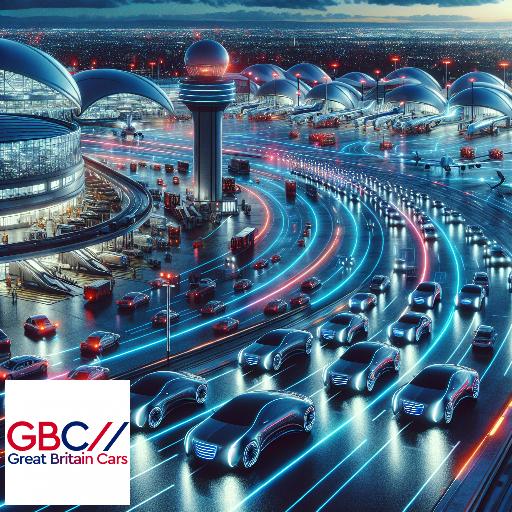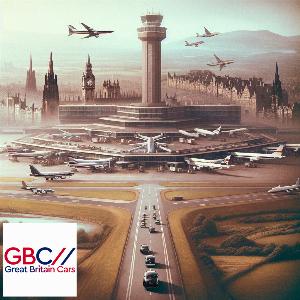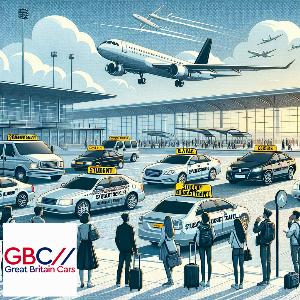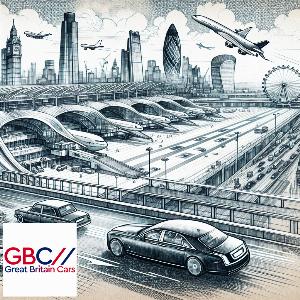London Airports: Preparing for the Arrival of Air Minicabs

Understanding Air transfers
As the world continues to evolve, so does the transportation industry. One of the latest innovations set to revolutionize the way we travel is the introduction of air transfers. London, a city known for its bustling airports, is preparing for the arrival of these futuristic vehicles. Air transfers are small aircraft designed to transport people over short distances, bypassing traffic congestion on the ground. They are expected to provide a quick, efficient, and environmentally friendly alternative to traditional transfers and public transport. London's airports, including Heathrow and Gatwick, are gearing up for this new era of transportation. They are investing in infrastructure and technology to accommodate these air transfers, ensuring safety and efficiency. The arrival of air transfers in London will not only change the landscape of the city's transportation system but also reduce travel time significantly. As we anticipate this exciting development, it's clear that the future of travel is not just on the ground, but in the skies.
Current State of London Airports
London airports are currently undergoing significant transformations in preparation for the arrival of air transfers. The city's major airports, including Heathrow, Gatwick, and London City, are investing heavily in infrastructure and technology to accommodate these futuristic vehicles. The airports are working closely with air transfer companies to ensure seamless integration of these services into existing operations. The introduction of air transfers is expected to revolutionize air travel, offering a faster and more efficient mode of transport for passengers. However, this also presents challenges in terms of safety, regulation, and noise pollution. Despite these hurdles, London airports are committed to leading the way in this new era of aviation. The current state of London airports is one of anticipation and preparation, as they gear up to welcome the future of air travel.
Infrastructure Requirements for Air transfers
As London airports prepare for the arrival of air transfers, significant infrastructure requirements must be met. The advent of air transfers will revolutionize the transportation system, reducing congestion and travel time. However, this innovative mode of transport requires a robust and efficient infrastructure to support its operations. Key requirements include the construction of vertiports - vertical take-off and landing (VTOL) facilities - at strategic locations for easy accessibility. These vertiports must be equipped with charging stations for electric air transfers, maintenance facilities, and passenger terminals. Additionally, a comprehensive air traffic management system is crucial to ensure safe and efficient operations. This system should be capable of handling increased air traffic, preventing collisions, and responding to emergencies promptly. Moreover, the infrastructure should be sustainable and environmentally friendly, aligning with the global push towards green transportation. This includes using renewable energy sources for operations and implementing noise reduction measures to minimize disturbance to the local communities. In conclusion, preparing for the arrival of air transfers in London airports necessitates significant infrastructure development, focusing on safety, efficiency, and sustainability.
Regulatory Challenges for Air transfers
As London airports prepare for the arrival of air transfers, they face a myriad of regulatory challenges. The integration of these new-age vehicles into the existing air traffic system is a complex task that requires careful planning and regulation. The Civil Aviation Authority (CAA) will need to establish new rules and guidelines to ensure the safety and efficiency of air transfer operations. These rules will need to cover a wide range of issues, from flight paths and altitude restrictions to noise pollution and privacy concerns. Furthermore, the CAA will need to work closely with air transfer operators to ensure that they comply with these regulations. The introduction of air transfers also raises questions about infrastructure. London airports will need to build new facilities to accommodate these vehicles, which could require significant investment. Despite these challenges, the potential benefits of air transfers - such as reduced traffic congestion and faster travel times - make them an exciting prospect for the future of transportation in London.
Potential Impact on London's Transportation System
The advent of air transfers could revolutionize London's transportation system, particularly impacting the city's airports. As these autonomous, electrically powered aircrafts become a reality, London airports are preparing for their arrival. The integration of air transfers could significantly reduce congestion on the city's roads and at major transport hubs, providing a faster, more efficient mode of transport. However, this new technology also presents challenges. Airports will need to invest in infrastructure to accommodate air transfers, including landing pads and charging stations. There will also be regulatory hurdles to overcome, as air transfers will need to operate within the existing air traffic control system. Despite these challenges, the potential benefits of air transfers are significant. They could transform the way we travel, making journeys quicker and more convenient, and could also have environmental benefits, as they are expected to produce fewer emissions than traditional cars. As such, London's airports are gearing up for their arrival, ready to embrace this exciting new era of transportation.
Economic Implications of Air transfers
The advent of air transfers is set to revolutionize the transportation landscape in London, with significant economic implications for the city's airports. As the technology matures, London airports are preparing for the arrival of these futuristic vehicles, which promise to alleviate congestion, reduce travel times, and provide a more sustainable mode of transport. Economically, air transfers could generate substantial revenue for airports through landing fees, maintenance services, and passenger amenities. They could also stimulate job creation in sectors such as air traffic control, engineering, and customer service. However, the introduction of air transfers also presents challenges, including the need for significant infrastructure investment and regulatory changes. Airports will need to adapt their facilities to accommodate vertical take-off and landing, while also ensuring safety and efficiency. Despite these hurdles, the economic potential of air transfers is undeniable, and London airports are gearing up to embrace this exciting new era of urban mobility.
Environmental Considerations for Air transfers
As London airports prepare for the arrival of air transfers, environmental considerations are at the forefront of planning. The introduction of air transfers promises to revolutionize travel, offering a faster, more efficient mode of transport. However, the potential environmental impact cannot be overlooked. Air transfers, while reducing congestion on roads, will increase air traffic, potentially leading to higher levels of noise and air pollution. Therefore, it is crucial to ensure these vehicles are as eco-friendly as possible. The use of electric or hybrid air transfers could significantly reduce carbon emissions, contributing to London's goal of becoming a zero-emission city. Moreover, the infrastructure supporting air transfers must also be environmentally sustainable. This includes the construction of vertiports, which should incorporate renewable energy sources and green building practices. In conclusion, while air transfers present an exciting development for London's transport system, their introduction must be carefully managed to minimize environmental impact. The future of air travel lies not only in innovation but also in sustainability.
Public Perception and Acceptance of Air transfers
The concept of air transfers is gradually gaining traction in London, with the potential to revolutionize the way people travel to and from airports. As congestion continues to plague the city's roads, the idea of bypassing traffic through the use of air transfers is becoming increasingly appealing. However, public perception and acceptance are crucial for the successful implementation of this innovative mode of transport. A recent survey indicates a growing acceptance of air transfers among Londoners, with many respondents expressing enthusiasm about the prospect of quicker, more efficient airport transfers. However, concerns about safety, noise pollution, and affordability persist. As London prepares for the arrival of air transfers, it is essential to address these concerns through rigorous safety testing, noise reduction strategies, and competitive pricing. Public engagement initiatives are also necessary to educate the populace about the benefits and practicalities of air transfer travel. The advent of air transfers in London could mark a new era in urban mobility, but only if public perception aligns with the technological advancements.
Potential Air transfer Operators in London
As London's airports prepare for the arrival of air transfers, several potential operators are emerging. Among them is Volocopter, a German start-up that has already conducted successful test flights in Singapore. They aim to offer air transfer services in London within the next three years. Another contender is Uber, which has announced plans to launch its Uber Air service in the city by 2023. British start-up Vertical Aerospace is also in the race, having successfully tested its prototype in 2018. These companies are working closely with regulators to ensure safety and efficiency in this new mode of transport. The introduction of air transfers in London could revolutionize travel, offering a solution to the city's congestion problems and providing a quicker, more convenient mode of transport for passengers travelling to and from the city's airports.
Future of Air Travel in London
The future of air travel in London is set to undergo a revolutionary transformation with the introduction of air transfers. London airports are already preparing for this groundbreaking shift, which promises to redefine urban mobility. The concept of air transfers, essentially small autonomous aircraft, is expected to alleviate traffic congestion and provide a faster, more efficient mode of transportation. London's major airports, including Heathrow, Gatwick, and London City, are gearing up to accommodate these futuristic vehicles. They are investing in infrastructure upgrades, including vertical take-off and landing pads, and advanced air traffic control systems. The integration of air transfers into London's air travel landscape will require significant regulatory changes and safety measures. However, the potential benefits, including reduced travel times and lower carbon emissions, make this an exciting prospect for the future of air travel in London. The arrival of air transfers is set to usher in a new era of urban transportation, making London a global leader in aviation innovation.
Our Latest Blog Posts

Heathrow to Somerset: Glastonbury, Wells, and Rural Charms
Blog about Heathrow to Somerset: Glastonbury, Wells, and Rural Charms

London Airports to Scotlands Capital: Edinburghs Timeless Allure
Blog about London Airports to Scotlands Capital: Edinburghs Timeless Allure

Lutons Hidden Gems: A Guide to Nearby Attractions
Blog about Lutons Hidden Gems: A Guide to Nearby Attractions

Stansted to the Welsh Coast: A Journey to Pembrokeshires Natural Wonders
Blog about Stansted to the Welsh Coast: A Journey to Pembrokeshires Natural Wonders
Blogs Pages
Luton to Lincoln: A Journey to Medieval England

Blog about Luton to Lincoln: A Journey to Medieval England...
Student Travel: Budget-Friendly Airport Minicab Options

Blog about Student Travel: Budget-Friendly Airport Transfer Options...
From Heathrow to History: A Tour of Londons Museums

Blog about From Heathrow to History: A Tour of Londons Museums...
Our Clients Testimonials

Great service
It is very great service and it's also reliable and on time always. I am really impressed by it.
Aana





Dependable
The driver was so dependable and arrived at in legitimate time which was so great.
Grace





Great cab
Great cab and awesome cab service. Comfortable seats each and every thing they are providing.
Richard





Extraordinary cab
Extraordinary cab and magnificent can support. Agreeable seats every single thing they are giving.
Nancy





Punctual
The driver was so punctual and reached in proper time which was so good.
Elizabeth





Amazing help
It is astoundingly unbelievable help and it's moreover reliable and on time by and large. I'm genuinely dumbfounded by it.
Brown





Solid and kind
The driver was entirely dependable, supportive and kind .His way of behaving was simply delightful.
Hannah





Surprising assistance
It is astoundingly incredible assistance and it's likewise dependable and on time generally. I'm truly astonished by it.
Clark





Fair values
It has fair values, kind , polite ,conversational and very helpful driver and pleasant too.
Emma





Reached on time
Due to this amazing cab service. We got our destination on the time.
Linda





Best opportunity
The driver was no doubt reliable, strong and kind .His approach to acting was just wonderful.
Logan





On time
Easy booking and the driver was on time , courteous and helpful.
Samuel





Solid and kind
The driver was no question, areas of strength for solid kind .His way to deal with acting was simply awesome.
Wright





Executive commute service
They are best in UK. They are providing executive commute service.
David





Fair characteristics
It has fair characteristics, kind , polite ,conversational and incredibly strong driver.
Robert





Maintenance
The vehicle is well maintained and cleaned . It was very fair.
Joseph





Best rates
They are also economically best as well. They have very reason able rates.
Mark





Fair qualities
It has fair qualities, kind , well mannered ,conversational and extremely supportive driver.
Sophia





Easy approach
Booking of Great Britain Cars cab is easiest and totally satisfying.
Daniel





Amenability
They have very neighborliness .They are genuinely agreeable in nature.
Jonson





